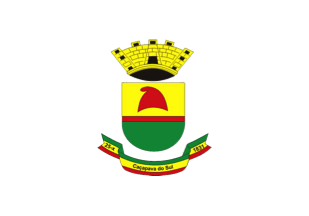 image by Ivan Sache,
13
July 2020
image by Ivan Sache,
13
July 2020
Last modified: 2020-07-14 by ian macdonald
Keywords: rio grande do sul | caçapava do sul |
Links: FOTW homepage |
search |
disclaimer and copyright |
write us |
mirrors
 image by Ivan Sache,
13
July 2020
image by Ivan Sache,
13
July 2020
The municipality of Caçapava do Sul (33,690 inhabitants in 2010; 30,471 ha)
is located 260 km of Porto Alegre.
Caçapava means in Tupi-Guarani "a
clearing in the forest", "the end of the road in the forest" or "the end of the
crossing of the mountain". A military post was established in 1777 in Paragem de
Caçapava, the site of an old camp founded by the Charrua in a clearing.
Caçapava was granted the rank of "vila" on 25 October 1831 and of "cidade" by
Law No. 1,535 promulgated on 9 December 1835.
Caçapava was from 9 January
1839 to 30 May 1840 the second capital of the Riograndense Republic established
after the Ragamuffin Revolution. Located in a strategic place, it was,
subsequently, the place of an arsenal and a garrison of the imperial army.
Fort Dom Pedro II is the only historic fortification kept until now in southern
Brazil. Never completed and never garrisoned, the fort was transferred in 1938
to the Institute of National Historical and Artistic Heritage.
In March 2011,
Caçapava joined the State Association of Historical Towns, which includes 13
town in Rio Grande do Sul.
https://prefeitura.cacapava.net/
Municipal website
Ivan Sache, 13 July 2020
The flag of Caçapava do Sul is prescribed by Executive Decree No. 17 issued
on 31 May 1972, as a "transposition" of the coat of arms, that is, white with
the municipal coat of arms.
Photos
https://www.mprs.mp.br/noticias/criminal/46558/>
https://www.facebook.com/camaradevereadoresdecacapavadosul
https://www.facebook.com/camaradevereadoresdecacapavadosul
https://www.facebook.com/camaradevereadoresdecacapavadosul
https://www.facebook.com/camaradevereadoresdecacapavadosul
https://www.facebook.com/camaradevereadoresdecacapavadosul
https://www.facebook.com/camaradevereadoresdecacapavadosul
The coat
of arms of Caçapava do Sul is described as follows.
Classical shield,
divided per fess by a line gules; upper field or charged in the center with a
liberty cap gules; lower field, vert.
Mural crown: copper composed of five
fortified castles.
Scroll or, in parallel vert and gules, inscribed in Gothic
letters "25 - X - Caçapava do Sul, 1831".
Historical and heraldic
rationale.
1. The coat of arms of Caçapava do Sul features a classical
shield, inherited by Brazilian municipal heraldry to evoke Brazil's constituting
race with Portuguese as primordial ethnic component.
2. The colors of the
field are or (yellow) and vert (green).
The upper field is or (yellow), a
metal that means, among other virtues, power, nobleness, force, wealth [...].
The lower field, vert (green) symbolizes the virtues of hope and faith, victory
and honor, [summarized] in the motto "Caçapava does not surrender". It also
recalls the greening fields where the town was established.
Yellow and green
maintain forever the national colors.
3. The main charge, the liberty cap
gules on or, synthesizes the emblem of republican governments, as the emblem of
liberty. It was adopted by the French republicans during the First Republic. Red
symbolically means discord and revolution, passion and indomitable love for the
conquest of an ideal; it also recalls the elevated proposals pushed by the
Riograndense Republic, which had it seat in Caçapava.
Accordingly, the coat
of arms of Caçapava do Sul alludes to its most expressive people's movement: the
contribution to the Ragamuffin Revolution, initiated by discord. The discord
originated in the unfair treatment of the glorious state of Rio Grande do Sul by
the central power, but it remained legal and pacific; the revolution was
legitimate, democratic, respectful of the law, placed on the altar of conscience
and commitment for the emerging Riograndense Republic. The motto - Liberty,
Equality and Humanity - recalls, in parallel, the republican propaganda of the
time, with extraordinary consequences for the whole country.
4. The
copper mural crown, a symbol of independence and municipal autonomy; its five
fortified, tower-shaped castles recall a fortified town, a fortress and Fort Dom
Pedro II, which appears on the arms more as an ornament than a proper symbol.
5. The scroll or, bordered vert (green) and gules (red), features the town's
name in Gothic letters and the writing "25 - X - Caçapava do Sul, 1831", the
date of political emancipation of the municipality of Caçapava do Sul and the
link between the municipality and the Ragamuffin Revolution.
The colors of
the scroll - vert, or and gules - maintains a close connection with the flag of
Rio Grande do Sul.
https://prefeitura.cacapava.net/portal/?i=6
Municipal website
Ivan Sache, 13 July 2020
The flag and arms of the Corps of Volunteer Firefighters of Caçapava do Sul
are prescribed by Municipal Law No. 1,173 promulgated on 11 July 2000.
Article 1.
The coat of arms of the Corps of Volunteer Firefighters of
Caçapava do Sul is described as follows:
Official municipal coat of arms,
with the following modifications: two hatchets crossed (in black). Instead of
the liberty cap, a firefighter's helmet of the same color, instead of the
scroll, a firefighter's hose with two points, in black, superimposed, in white,
by the letters "SCCBVCS" and the date of foundation, "18-08-1996", in the upper
part the writing, in a semi-circular pattern, "BOMBEIROS VOLONTARIOS" (in red)
and in base "CAÇAPAVA DO SUL".
Article 2.
The flag of the Corps of
Volunteer Firefighters of Caçapava do Sul is described as follows:
A
rectangle of white cloth with the coat of arms set up on both sides, as
prescribed in the previous Article, centered, in various legal dimensions.
Article 4.
The flag of the corporation shall be hoisted daily on the
headquarters of the Corps of Volunteer Firefighters and shall be used in all the
municipal festivals, incorporated to the Corporation's Flag Guard.
https://leismunicipais.com.br/a/rs/c/cacapava-do-sul/lei-ordinaria/2000/118/1173/lei-ordinaria-n-1173-2000-institui-o-brasao-e-a-bandeira-do-corpo-de-bombeiros-voluntarios-de-cacapava-do-sul-e-da-outras-providencias
Leis Municipais database
Ivan Sache, 13 July 2020